- Home
- Beth Gutcheon
The Affliction Page 24
The Affliction Read online
Page 24
“Won’t Lauren be sad if you move back?”
“The twins might be, but Lauren is so busy I doubt she’d notice. How was Avis Metcalf, speaking of grandchildren?”
Maggie told her about Hugo and Belinda, and the fake Claude Lorrain.
“Damn,” said Hope.
“Yes. So he found his rich wife. Poor Caroline. Now what do we do?”
“I think my man Angus should be our next stop.”
“I do too. My impression is that Avis won’t go looking for dirt, but she’d confirm or deny what we find out on our own.”
“Angus won’t mind looking for dirt, if Hugo is making his sister unhappy. Or blotting the family copybook. You said you had other news.”
“I do. I talked with young Christina last night. She said things are going pretty well, except for the Goldsmith nightmare.”
“Explain.” A young woman ran by, sideswiping Hope and shouting on her cell phone.
“You know how people are about school shootings,” Maggie said. “We did our best to make it underwhelming, but good luck with that. When Marcia tried to go home from the hospital, she found her house was a designated crime scene. Yellow tape all around the property, the police inside tossing everything, looking for weapons, looking for bombs. They completely trashed the living room and all the bedrooms, confiscated computers and notebooks no matter who they belonged to. Some tabloid published an aerial photo of the house—you’ve seen that house, it’s a handyman special in a failed development, but from the air it looks big and the press called it a mansion, so people are demonizing these ‘rich’ people who screwed up their kid.”
“God.”
“The place was surrounded by the media that night and for days afterward. She had to go hide out with Todd’s sister in Connecticut, and that wasn’t so comfortable, because Todd’s family has blamed her for years for spoiling Jesse. As they see it.”
“People are so sure they’d know what to do with other people’s children. You should have heard Hank’s family on the subject of Buster. If I was such a bad mother, how did Lauren turn out so well?”
“And Buster turned out fine too.”
“Right. So screw them.”
“So the police escorted Marcia into her house a couple of days ago just to get a change of clothes and some meds she needed, and she saw what they’d done to the place.”
“Where is she now?”
“Still with the sister-in-law, I guess. She can’t even go to see Jesse, for fear the press will tail her back to her hidey-hole. She isn’t looking at social media at all, thank god, but Christina sends someone to pick up her snail mail and screen it, and it is horrible. People saying they hope Jesse dies. NRA people blame her for bad gun publicity and say she should be shot, or shoot herself. Antigun people, who are even worse.”
“I had no idea,” Hope said.
“But you see the problem this causes for Christina.”
“Are the papers all over the campus again?”
“They are, but surprisingly, they don’t seem to be getting much traction. The girls claim they weren’t there, or didn’t see anything.”
“Go Christina.”
“Yes. That was a teaching moment. No, her problem is, she’s down one French department. Marcia was all she had. Finding a qualified sub this late in the year, for what they can pay, is next to impossible. She got some responses to her ad, mostly bored housewives who were good at French thirty years ago but have never taught. The first three people who interviewed for the job all turned out to be reporters. For Pete’s sake. Didn’t they think we’d check?”
“Who is this ‘we’? Oh wait. Christina hired you,” Hope crowed, proud to have figured it out before she was told. “Do you even speak French?”
“I haven’t since I was twenty-three except when I had to take the French lunch table once or twice a year.”
“Oh, that sounds good enough. I remember everything I knew when I was twenty-three.”
“I’m glad you approve.”
“Approve? I’m thrilled. It’s a perfect cover. What is she paying you?”
“I’m not telling.”
“When are you leaving?”
“This afternoon. The girls have exams to study for, and I have some brushing up to do.” They passed the woman who had been yelling into her cell phone. She was sitting on the verge beside the path, with her face stained with tears and one cheek abraded by gravel, examining an ankle that was beginning to swell. Maggie slowed. Hope sensed that she was about to go back to offer help and with a firm grip on her elbow, moved her on. “Don’t,” she said. “It’s another teaching moment.”
Detective Bark was on Ray detail. Detective Phillips was working on Jesse. She had interviewed him several times, with his father present, and knew a great deal more than she had before about his inner life. He’d used his brother’s ID and money he stole from his mother to buy the shotgun at a gun show. He didn’t look much like his brother, but still, it hadn’t been that hard. The dealer was stupid. Almost everybody was stupid, full of themselves and easy to fool, if you were Jesse.
Forensic IT guys had gone through his computer and phone. There was a rich harvest of ranting, much of it obscene, against girls who ignored him or laughed to each other behind their hands if he spoke to them. Skanks who swarmed around his fuckboy brother. Girls who didn’t answer when he asked for noods on Snapchat but sent pictures of their boobs and their butts to their “boyfriends,” who laughed at them and posted screenshots of pictures the moron girls thought were private, which he never would but they never bothered to get to know him. He had a permanent front-row seat plus a backstage pass to the parties he wasn’t invited to, the dramas and romances of the teenagers around him, all of whom were morons, all of whom would be amazed someday. And very, very sorry.
His mother was a moron. It was her fault he had to wear her long blue raincoat to hide his shotgun. It should have been a trench coat. Black. Or his father’s tan one would have been all right. Phillips’s eyes had flicked to Jesse’s father when the boy said this. Todd sat slump-shouldered in his stiff chair beside the hospital bed, his face a blank as his son described how stupid his mother was, how she’d wrecked the family. He blamed her for his father moving out.
But this contrasted with the tone of his messaging with Florence Meagher, who called him Jamie, short for Jesse James and whom he called Floro, as her husband did. With her he was almost unguarded. She “got” him. He told her about a girl he was in love with. No one else knew. He was going to ask her out soon. He was going to bring her to his house and show her his room, and let her play with his hamsters. They would be in the musical together. Florence wasn’t laughing at him. Until it turned out she was.
But Phillips couldn’t put any of this together with Florence’s murder. Strangling someone takes heft and physical strength. Jesse couldn’t weigh more than a hundred pounds soaking wet. And moving the body required a car. Jesse could drive; his father confirmed that he knew how; Marcia had taught him. But he didn’t have a license and he didn’t have a car. Usually.
“How did he get to the gun show?” Bark asked, at this point in Phillips’s reporting.
“Marcia’s car. She’d gone to a wedding in Hartford with a couple of friends. This was in March sometime. Left the keys in the car. His mother is very stupid, remember.”
“Without a license?”
“He knew he couldn’t afford to be pulled over, so he drove super carefully. No one was going to notice. Cops are morons too.”
“I see,” said Bark.
Ray was eating a sandwich in the deli on Main Street when a shadow fell across the paper he was reading. The shadow belonged to Charlie Bark, who had a chai latte in his hand.
“Mind if I sit?” Bark said, sitting.
Ray stared at him. There was an alfalfa sprout in the corner of his lips. When Bark didn’t say anything more, Ray took another bite of his sandwich and went back to reading his paper.
Except tha
t focusing his attention was now a problem. He turned a page and stared at it for a while, then looked up. Bark was regarding him steadily.
“You wanted something?” Ray asked, with an air of delivering a remark of cutting wit.
“Just in the neighborhood,” Bark said.
Ray ostentatiously turned in his chair to observe the other tables in the deli. At least three were empty. He turned back to look at Bark, his eyebrows raised.
“How’d you get into the pool house, Ray?” Bark asked.
Ray gaped at him, suddenly totally focused, his eyes slightly bulging.
“I don’t know what you’re talking about.”
“The building where your wife’s body was found. How’d you get into it?”
“I didn’t! What the fuck?” Ray was the kind of man who, when he felt anything he didn’t want to feel, like fear or guilt or pity, transformed it to anger. Bark could feel it radiating from him.
“You’ve got no alibi, Ray. You had plenty of time to get back from the Poconos and dump the body. I’m not sure yet where it was, the body, before you dumped it, but I’m working on it.”
“You are just fishing, asshole. You’ve got nothing on me, because I’m innocent. This is harassment!”
“We found her purse. The purse you dumped in the Wallenpaupack Lake on the way back to the casino that night. It had the key to the pool house in it.”
Ray stood up. “I’m not talking to you without a lawyer.” And he stalked out of the deli. Bark reached across to the untouched half of his sandwich to see what was in it. Salami, cheese, tomatoes, sprouts. He liked salami. He ate.
Chapter 17
Friday, May 8
Angus Westphall stood as Hope approached the table for two he’d reserved in the Members Dining Room at the Metropolitan Museum. He’d been on the board so long the table practically had his name on it; he loved the midday view of Cleopatra’s Needle and Central Park. Rain spattered against the glass wall that slanted over them as the captain pulled out a chair for Hope and waited as she and Angus kissed each other on each cheek.
“This is very grand, Angus,” said Hope, settling her napkin in her lap.
“My canteen. The food is fine, but I think it’s the best view in New York,” he said happily. His pink complexion glowed, and she smiled to see that he still favored bow ties. She liked that in a plutocrat.
The captain was back with an ice bucket holding a bottle of Taittinger, followed by a waiter with champagne flutes. The captain presented the bottle for Angus’s inspection, which he performed by sliding his glasses a little way down his nose and peering at the label.
“Angus, how nice!” said Hope.
The cork popped with a discreetly muffled thunk into the waiter’s white cloth.
“We’re celebrating.”
“Would you like to taste, sir?” the wine waiter asked.
“No, just pour, please,” said Angus without looking away from Hope.
“Celebrating what?” asked Hope.
“That you’re moving back.” He lifted his glass to hers and they clinked as Hope said, “Thinking of moving back.”
“Oh, I have faith,” said Angus. “New York spoils you for anything else.”
Well, it certainly would if every stitch of clothing you own is custom-made, and you eat lunch at this table every day, Hope thought.
“Now tell me where you’re looking,” Angus said. There is nothing New Yorkers enjoy more than contemplating real estate, even if, like Angus, they’ve lived in the same Park Avenue triplex since before the first moon shot.
“Let’s decide what to eat,” said Hope, “then we can concentrate on conversation.”
“Good idea,” said Angus. He would never have thought of suggesting it because he ordered the same thing every day, poached asparagus followed by the Gruyère Soufflé. If the chef absolutely could not recommend the asparagus, he sent out a salad.
When she had accepted the waiter’s recommendation of grilled octopus to start, and Angus had persuaded her to have the soufflé as well, Hope said, “I’m thinking of downtown.”
“Really! Why?” And Hope described the fresh views, the surprising street life, the sense of newness and experiment. Angus looked at her smiling as if he’d never heard anything so original, and perhaps he hadn’t.
“To be honest, though,” said Hope, “I wanted to talk with you about something else. I’m a little worried about Caroline.”
Instantly, Angus’s demeanor changed.
“I know he’s your brother-in-law, so forgive me if this is out of bounds, but could we talk about Hugo?”
Angus took a slug of champagne, as if for once he wasn’t noticing that he was savoring the best of everything.
“We could. It’s high time someone did.”
Hope raised her glass to him and they clinked again, to the start of a new understanding.
“Tell me this,” she said. “What does Caroline know? How does she feel about her marriage? She totally stonewalled me on the subject, I thought she was happy as a clam with him.” Her grilled octopus was put in front of her and she added, “Why do people say that? There must be something happier than clams.”
“Larks,” said Angus. He began, perfectly correctly, to eat his perfectly cooked asparagus with his fingers.
“I thought she was as happy as a lark.”
“Yes. She’s good at that,” said Angus. “You know about her first divorce.”
“I do.”
“That was a mess, embarrassed her and the rest of us and cost her a lot of money. She hated it. Well, I mean. No one enjoys being divorced, we both know that. I know it a little better than you, even,” he said, alluding bravely to the fact that he’d been through it three times. “But she took it harder than most. Inside herself. You remember what Mother was like with Caroline, always implying she never got things right, wanting her to be perfectly groomed and to spend her life at the dressmaker’s, and Caroline wanted . . . well I think, Hope, that she wanted to be like you.”
“Like me!” Hope knew absolutely when someone was trying to snooker her, and could hear the champagne talking, but this was interesting.
“Someone like you, someone who wasn’t afraid to be unconventional. I’ve always thought she’d have liked to have a career. Or, you know, move downtown, live in a loft . . . I don’t know.”
If Angus’s idea of unconventional in this day and age was living in a three-million-dollar loft in Tribeca, Hope thought, good luck to all of them, but she knew what he was trying to say, no matter how limited his perspective. Their mother had worshipped her son and been endlessly carping toward Caroline.
“Never too late for a career,” Hope said, since she was just now contemplating beginning her first one.
“No, no . . . I mean yes, you’re right, but that’s not the issue at the moment. She couldn’t admit that her first marriage was a mistake for so long because of what Mother would say, and in the event Mother was horrible about it. But that’s all changed now.”
“How, exactly?”
“Our parents are dead,” said Angus. “And besides, Hugo is such a shit.”
Hope might have spilled her wine, if her glass hadn’t been empty. People drink more than they mean to in the throes of emotion, she knew, and she and Angus noticed at the same time that their bottle was empty, upside down in the bucket.
“Shall we have another?” Angus asked.
“Why not.”
While Angus finished his asparagus, and the wine waiter bustled about them, Hope told him what they’d learned from Avis Metcalf.
“You know her, of course?” Hope asked. To her surprise, Angus blushed.
“I adored her at one time,” he said eventually. “This was after you threw me over. But Harrison Metcalf got in before me.”
“I didn’t throw you over.”
“What would you call it?”
“I wandered off.”
“Oh. Well in any case I do know Avis. Did, at least. She’s ver
y busy these days.”
“You’re in the art world. Had you ever heard that story? That Hugo sold Belinda Binney a phony Lorrain?”
Angus liked to call himself a “collector, in a small way.” As with so much in Angus’s worldview, “small” was relative. “I hadn’t heard it and I’m glad; Belinda would have been mortified. But I do know that his reputation among the better dealers isn’t good. What you heard is true; he’d move in on another dealer’s client and let slip disparaging things about the first dealer, then start selling to the client himself, sometimes work that wasn’t the best. And there’s the other issue. A man’s private life is his own, but not when he’s married to my sister.”
“Meaning?”
“In Europe, in certain circles, it’s believed that theirs is a white marriage.”
“You mean that . . .” Hope was beginning to feel the bubbles and had to pause to ponder the right way to put it.
“They think Caroline is a beard, that the marriage is sexless. Abroad, he’s known as a gay man. Or at least seriously bi.”
“Then where do they think Lily came from?”
“I have no idea. But here’s the shameful part; I know my sister. She’s a loving, generous woman. If only he was honest with her, she would have understood. But he lies for the fun of it.”
“Is she in love with him?”
“Is. Was. I don’t know, we can’t talk about it.”
“You’ve tried?”
“Yes, but I made a hash of it.”
“Tell me.”
“It was early in the marriage. He asked to borrow some money from her. Quite a lot. It worried her and surprised her because he’d led her to believe he came from money. She came to ask me what I thought.”
“What’s quite a lot?”
“A million? A mill five? Something like that.”
Hope whistled. It took her two tries, but she managed.
“So I asked around and found out that he had a client in Europe who was building a collection, one of those deals where she wanted at least one work from every great old master, even if it’s a second-rate piece. Was planning to build a museum with her name all over it and leave the whole thing to the nation. She was shopping for something specific, old and fairly rare. A Cranach. The Elder.

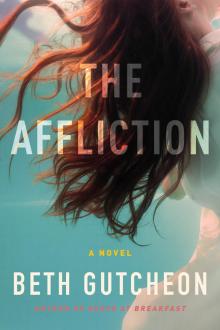 The Affliction
The Affliction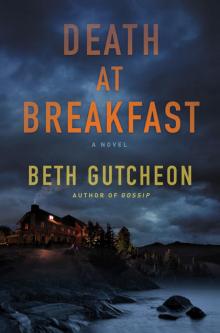 Dead at Breakfast
Dead at Breakfast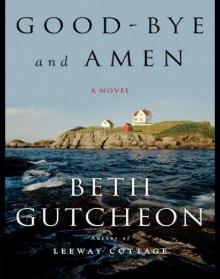 Good-bye and Amen
Good-bye and Amen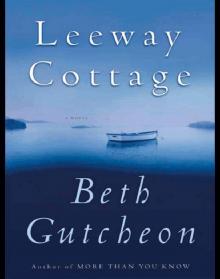 Leeway Cottage
Leeway Cottage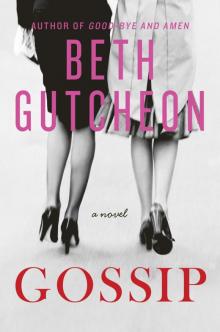 Gossip
Gossip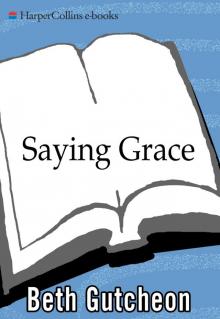 Saying Grace
Saying Grace